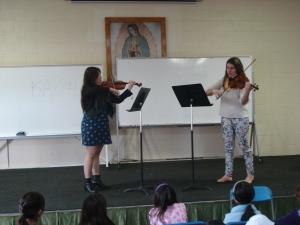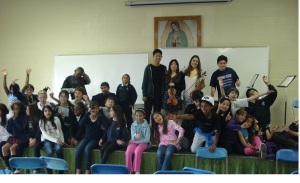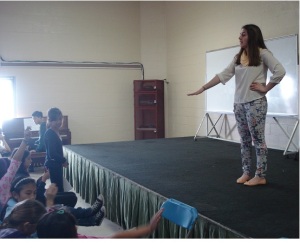Kristina Zlatareva Sparks Students’ Imaginations
“As a young artist and leader, I firmly believe that it is my responsibility to inspire and connect with the public through classical music.”
After appearing on Show 263 in Davis, California, with The Angeles Trio, 19-year-old violinist and Jack Kent Cooke Young Artist Kristina Zlatereva created a powerful musical experience for students at the St. Anne Catholic School in Santa Monica, California. Read her beautifully written account of the experience below:
Music — the Gateway to Eternity
by Kristina Zlatareva
Albert Einstein once said: “Imagination is more important than knowledge. For knowledge is limited, whereas imagination embraces the entire world, stimulating progress, giving birth to evolution.” As a young artist and leader, I firmly believe that it is my responsibility to inspire and connect with the public through classical music. Art is a universal language, whose impact endorses every individual’s ideas, regardless of their cultural background, socioeconomic status, age or personal beliefs. Art abolishes class and race, and in its essence is hidden the idea of universal validation of every human’s imagination, no matter how different and unconventional it may seem in the eyes of society. Inspired by Einstein’s words, I decided to dedicate my Arts Leadership Project to working with children, and that led me to the music students of the St. Anne Catholic School in Santa Monica, California.
A K-8 school, St. Anne consists of more than 200 students from which the majority come from low-income families, who cannot afford to make art their children’s priority. The 40 music students whom I met with are so-called “lucky,” because they are permitted by the school and their parents to participate in the music program. Although they have an advantage to have music classes at their school, I found out that for them sitting in a classroom with eight to ten other kids for one-hour music sessions deprives them of individual attention which is needed to unlock their talent and potential. For many of the St. Anne students, learning an instrument seems like another ordinary activity at school.
Witnessing this, I decided to organize an informal event, where the children did not have to feel obliged to sit quietly and listen to music which they cannot understand, but where they could have their voices heard and opinions valued. Together with three of my musician friends, I performed a concert, including pieces for violin, piano, and cello from different classical periods.
 Before each performance we talked about the different composers and history of every piece and at the end we opened a discussion, where the students had the opportunity to share their individual comments — what they liked or disliked about the music, how it made them feel or what it made them think about. Lupita, a violin student, shared her honest opinion about the beginning of Chopin’s Prelude No. 15, Op. 28: “It’s like I could see a million bubbles floating in the sky. However, I liked it only until the loud part started in the middle. It should have been quieter all the way through, don’t you think?” How funny, I thought, that Chopin gave “Raindrop” as the title to the Prelude and Lupita imagined flying bubbles; and it was not coincidental, because music inspired a connection between a child’s imagination and an adult’s artistic vision. Despite the different eras they lived in and the differences in age and knowledge, I think Lupita felt the music the same way Chopin did. So, here is a proof that art is timeless — be it a painting, a poem, or a musical piece, it carries an eternal message that never alters throughout the ages.
Before each performance we talked about the different composers and history of every piece and at the end we opened a discussion, where the students had the opportunity to share their individual comments — what they liked or disliked about the music, how it made them feel or what it made them think about. Lupita, a violin student, shared her honest opinion about the beginning of Chopin’s Prelude No. 15, Op. 28: “It’s like I could see a million bubbles floating in the sky. However, I liked it only until the loud part started in the middle. It should have been quieter all the way through, don’t you think?” How funny, I thought, that Chopin gave “Raindrop” as the title to the Prelude and Lupita imagined flying bubbles; and it was not coincidental, because music inspired a connection between a child’s imagination and an adult’s artistic vision. Despite the different eras they lived in and the differences in age and knowledge, I think Lupita felt the music the same way Chopin did. So, here is a proof that art is timeless — be it a painting, a poem, or a musical piece, it carries an eternal message that never alters throughout the ages.
I learned from the St. Anne students more than I could have ever imagined. They inspired me to see music in a simpler way, in a purer form, based solely upon human feelings. They reminded me that music is not always meant to be theoretically analyzed and critically evaluated, but its main purpose is to bring joy and emotional freedom to people. The main idea behind my project was not to teach dates or facts about composers and pieces, but to show that music and its power to give freedom can be trusted. I hope that the children will use it in the future as a tool for discovering inspiration and expanding their imagination. I truly hope that they will use music as their ally where words are powerless to resist the circumstances.
I have learned that in this material world, so fragile and filled with uncertainties, there is nothing more comforting than to know that music exists for the purpose of giving abundance to one’s soul and lifting one’s spirit. I have learned that music gives wings to the human imagination, thus breaking the boundaries of reality and allowing one’s dreams and ideas to flourish and come to life.




